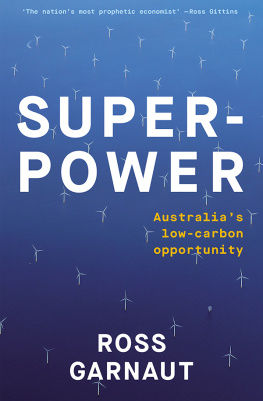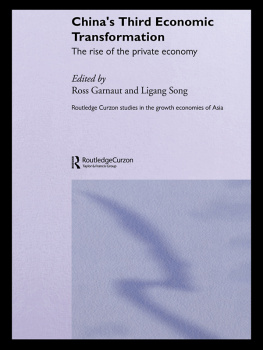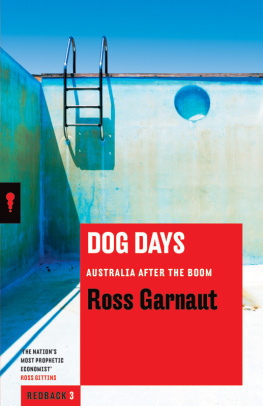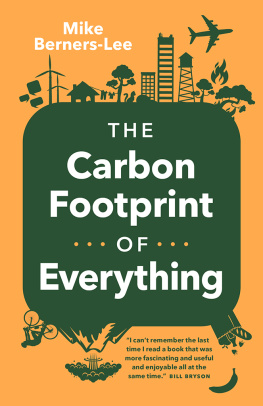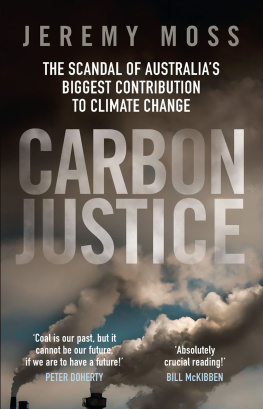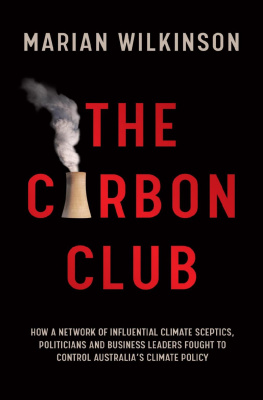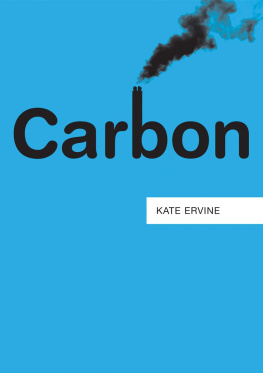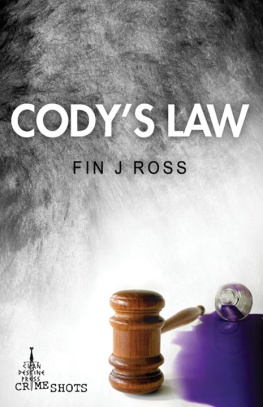Published by La Trobe University Press
in conjunction with Black Inc.
Level 1, 221 Drummond Street
Carlton VIC 3053, Australia
www.blackincbooks.com
La Trobe University plays an integral role in Australias public intellectual life, and is recognised globally for its research excellence and commitment to ideas and debate. La Trobe University Press publishes books of high intellectual quality, aimed at general readers. Titles range across the humanities and sciences, and are written by distinguished and innovative scholars. La Trobe University Press books are produced in conjunction with Black Inc., an independent Australian publishing house. The members of the LTUP Editorial Board are Vice-Chancellors Fellows Emeritus Professor Robert Manne and Dr Elizabeth Finkel, and Morry Schwartz and Chris Feik of Black Inc.
Copyright Ross Garnaut 2019
Ross Garnaut asserts his right to be known as the author of this work.
ALL RIGHTS RESERVED.
No part of this publication may be reproduced, stored in a retrieval system, or transmitted in any form by any means, electronic, mechanical, photocopying, recording or otherwise, without the prior consent of the publishers.
9781760642099 (paperback)
9781743821176 (ebook)

Cover design by Akiko Chan
Text design by Dennis Grauel
Typesetting by Akiko Chan
To the Mutthi Mutthi, Paakantiji and Ngyimpaa people, and to Tom, in whose country this story begins.
To Kai, Harvey, Leila, Luis, Eza, Sam and Isla, who close this story.
And to Indigenous Business Australia and its big role in the next.
1
A PERSONAL REFLECTION ON AUSTRALIAS CLIMATE CHANGE ODYSSEY
In the first half of August 2019, my wife Jayne and I took a journey through the MurrayDarling Basin. We spent a couple of days at Lake Mungo, where the ice age overflow from the Lachlan once filled lakes and supported communities that left us with what may be the oldest record on earth of complex human mind and spirit. Then we turned up the Darling to Menindee, where Harrison made his pile when Pardon won the cup. Once the source of Broken Hills water, and of renowned grapes and fruit, in the past year the Menindee Lakes have been famous only for a plague of dead fish. They are mainly dry. A new pipeline is raiding the Murray to supply Broken Hill. We cut across to Wilcannia, once a bustling port collecting wool and copper ores brought in by camels and bullocks for shipping down the river to Goolwa and Port Adelaide. Here was a little water, held back by the barrages, low and still. Finally, we crossed the Lachlan at Hillston and the Murrumbidgee near Griffith, and returned to the magnificent but weakening Murray once more. This was beautiful Australian country, rich with the human heritage of 50,000 years and 200 years.
For many Australians, their personal heritage lies in the Basin. Jaynes father, Tom, lived in Wentworth and the lower Darling until he and many others in the bush rode to Melbourne on the news of war in 1914. That ride led him to a beach in Turkey, as the rising sun lit the coastal hills on 25 April 1915. A decade ago, a board in the Wentworth RSL club remembered Tom and his brother. This building without its memorabilia is now empty beside the Darling.
What value do we place on Australian heritage? The question kept coming back as we travelled the Darling. For about 30 kilometres the bottom of the riverbed is wet from the flowback from the Murray. But beyond that, the sand between the rows of grand old river gums is dry, except for scattered stagnant pools. By one of these lay the skeletal head of a Murray cod, its mouth gaping wide enough to swallow the largest carp whole. The dried flesh on the cods back had been gnawed by wild pigs, which had waded into the shallow pond and dragged out the helpless survivor of eighty summers and a dozen droughts. Around a fire on the riverbank one night, we were told of plans for a quad bike ride along the Darling bed from just north of Wentworth to the arid Menindee Lakes.
Mike Sandiford, professor of geology at the University of Melbourne, is using new, satellite-based remote-sensing techniques to map the water contained in the structures below the surface in the Darling Basin. For millennia, water in occasional floods has filled porous sands and cavities and seeped out to maintain the life of plants and animals through the long dries. But now these occasional floods are treated as surplus, and held back for irrigation in the northern Darling and its tributary, the Barwon. Professor Sandiford foresees lower run-off from higher temperatures, reduced average rainfall and more insistent demands of irrigation interacting to contrive the desertification of the Basin. These factors are reproducing the fate of the Tigris and the Euphrates several thousand years ago, when the riverways that nurtured the beginnings of agriculture and human civilisation evaporated into todays Iraqi deserts.

